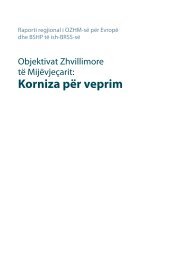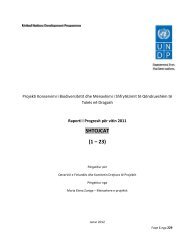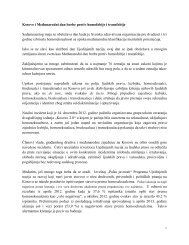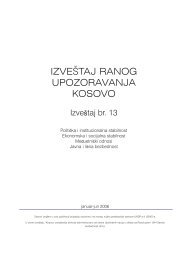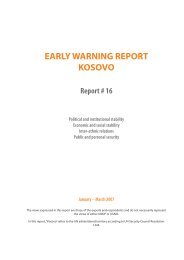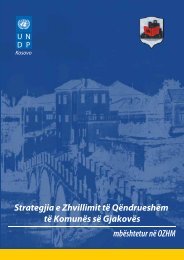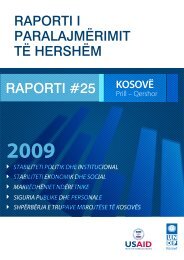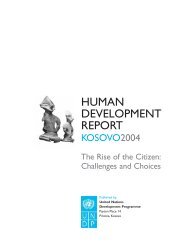Kosovo Human Development Report 2010 - UNDP Kosovo - United ...
Kosovo Human Development Report 2010 - UNDP Kosovo - United ...
Kosovo Human Development Report 2010 - UNDP Kosovo - United ...
Create successful ePaper yourself
Turn your PDF publications into a flip-book with our unique Google optimized e-Paper software.
passes poor health and education<br />
values on to children already at high<br />
risk of exclusion.<br />
4. <strong>Kosovo</strong>-RAE minorities: <strong>Kosovo</strong>-<br />
RAE communities are the face of<br />
exclusion in <strong>Kosovo</strong>. They have the<br />
highest exclusion rates from factor<br />
markets (40.6 percent cannot access<br />
any factor markets compared<br />
to just 8 percent of Kosovans in<br />
general). Nearly 60 percent are<br />
excluded from basic goods and<br />
services, unable to meet their critical<br />
needs, compared to a 21.1 percent<br />
<strong>Kosovo</strong> average. <strong>Kosovo</strong>-RAE<br />
households experience above<br />
average rates of unemployment<br />
(58 percent versus 48 percent),<br />
with 75 per cent of male youth<br />
aged 15-24 unemployed. Only 8<br />
percent of working <strong>Kosovo</strong>-Roma<br />
hold managerial positions in comparison<br />
to 13.9 percent of ethnic<br />
<strong>Kosovo</strong>-Serbs and 15.8 percent of<br />
other minority groups. <strong>Kosovo</strong>-<br />
RAE children are the most excluded<br />
from education, with a quarter<br />
not attending primary school at<br />
all and two thirds or more not in<br />
secondary school. Only 1.4 per<br />
cent of <strong>Kosovo</strong>-RAE women and<br />
men attended or have finished<br />
high school and a tiny minority<br />
have completed or even attended<br />
university. At least 16 percent of<br />
<strong>Kosovo</strong>-RAE are illiterate, rising to<br />
one quarter among <strong>Kosovo</strong>-RAE<br />
women. The participation rate of<br />
<strong>Kosovo</strong>-RAE in public offices is just<br />
8 percent of non-Serb ethnic minorities,<br />
while they compose more<br />
than one third of non-Serb minority<br />
population. For <strong>Kosovo</strong>-RAE living<br />
in the Mitrovicë/Mitrovica region,<br />
heavy metal poisoning from<br />
lead contamination is destroying<br />
their health and weakening capacity<br />
to escape exclusion. All <strong>Kosovo</strong>-<br />
96 | KOSOVO HUMAN DEVELOPMENT REPORT <strong>2010</strong><br />
RAE children living near contaminated<br />
areas show deeply damaging<br />
levels of lead in their blood. The<br />
greatest problem that <strong>Kosovo</strong>-RAE<br />
families face, however, is socio-cultural.<br />
They are alienated from wider<br />
<strong>Kosovo</strong> society, frequently discriminated<br />
against, unrepresented and<br />
ignored. Inexistent opportunities<br />
for integration perpetuate exclusion.<br />
However, social inclusion in<br />
<strong>Kosovo</strong> cannot move forward if<br />
they are left behind. A <strong>Kosovo</strong>-RAE<br />
female child living in a temporary<br />
camp in Mitrovicë/Mitrovica is the<br />
most excluded individual in <strong>Kosovo</strong>,<br />
and deserves the greatest level<br />
of support.<br />
5. People with special needs: only<br />
10 percent of children with special<br />
needs are in mainstream education<br />
due to alienation, lack of adequate<br />
facilities and access and inability to<br />
travel. Employment is precluded to<br />
the physically disabled without adequate<br />
urban infrastructure and facilities<br />
to enable their access and work.<br />
This exposes the disabled to poverty<br />
in the absence of access to other factor<br />
markets (particularly in secondary<br />
towns and cities where factor markets<br />
other than employment and business<br />
are limited). The high cost of drugs,<br />
unavailability of specialist medical<br />
care and inaccessibility of healthcare<br />
centres also excludes many disabled<br />
people from healthcare that could<br />
improve their life opportunities.<br />
(iii) Policy responses cannot address<br />
“(...) we must put people themselves first,<br />
and develop their untapped potential.<br />
<strong>Human</strong> capital is <strong>Kosovo</strong>’s greatest asset<br />
– from the vibrancy and enterprise of its<br />
youth – to the diversity of its cultural and<br />
ethnic heritage (...)”<br />
Osnat Lubrani, Editorial in “Koha<br />
Ditore”, December <strong>2010</strong>



